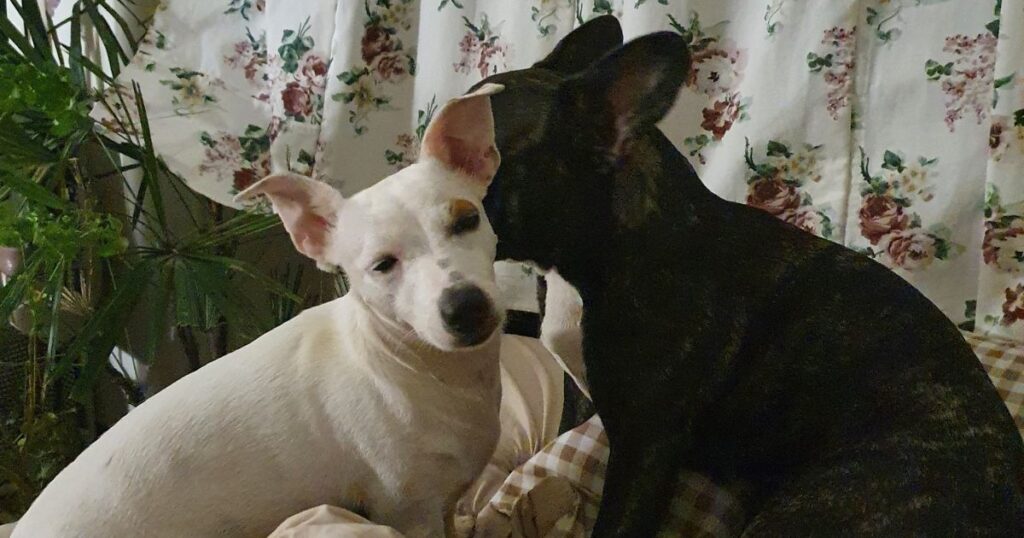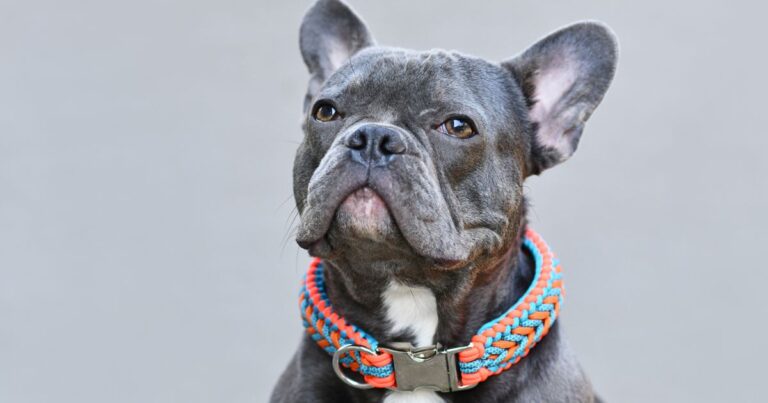French Bulldog Aggression: Separating Fact from Fiction
French Bulldog Aggression – sounds like a fearsome tale, doesn’t it? But hold onto your leashes, because this story has more bark than bite! Are French Bulldogs really aggressive, or is it just a misunderstood growl? Spoiler alert: It’s mostly a myth. Stick around, and we’ll debunk the misconceptions, one wagging tail at a time.
Table of Contents

French Bulldog Aggression
| Characteristic | Description |
|---|---|
| Temperament | Friendly, affectionate, intelligent |
| Socialization | Essential for well-adjusted behavior |
| Training | Responds well to positive reinforcement |
| Common Myths | Aggressive, dangerous to children, hostile to other dogs |

Understanding the French Bulldog
French Bulldogs are often misunderstood, and it’s high time we set the record straight. These dogs are not the aggressive beasts some make them out to be. They’re charming, affectionate, and intelligent. Sure, they have a muscular build and a strong presence, but that doesn’t mean they’re inherently aggressive.
The myth of French Bulldog aggression is often a reflection of misunderstanding rather than the true character of these delightful dogs.
In my opinion, labeling French Bulldogs as aggressive is a gross injustice to the breed. It’s a stereotype that has been perpetuated without proper understanding. Like any breed, French Bulldogs have individual personalities, and their behavior is often a reflection of their upbringing, training, and socialization.
What’s crucial to understand is that French Bulldogs are generally eager to please. They thrive on human interaction and often form strong bonds with their families. This affectionate nature is at odds with the aggressive label they sometimes receive.
However, it’s essential to recognize that any dog, regardless of breed, can exhibit aggressive behavior under certain circumstances. Lack of socialization, poor training, or underlying health issues can lead to undesirable behaviors. But these are not traits specific to French Bulldogs; they can be found in any breed if not properly cared for.
In conclusion, understanding the French Bulldog requires looking beyond stereotypes and recognizing the individuality of each dog. With proper care and attention, French Bulldogs can be loving and gentle companions.
Factors Influencing French Bulldog Behavior
- Genetics
- Upbringing
- Socialization
- Health
- Training

Personal Experience with French Bulldogs
Let me tell you about my French Bulldog, Croissant. He’s far from the aggressive stereotype that haunts this breed. Croissant is loving, playful, and incredibly loyal. He’s a testament to what French Bulldogs can be when raised with love and proper training.
I’ve had Croissant since he was a puppy, and I made sure to invest time in his socialization and training. I exposed him to various environments, people, and animals. This early socialization has shaped Croissant into a well-adjusted and friendly dog.
But it’s not just about training and socialization. Croissant’s personality shines through in everything he does. He’s curious, affectionate, and has a sense of humor that keeps me entertained daily. He’s not just a pet; he’s a member of the family.
I’m not saying that every French Bulldog is like Croissant, but I firmly believe that the breed’s so-called “aggression” is often a misunderstanding or mismanagement. Croissant’s behavior is a reflection of the time, effort, and love I’ve put into raising him.
In my opinion, owning a French Bulldog is a rewarding experience that challenges the myths surrounding the breed. Croissant has taught me that with understanding, patience, and proper care, French Bulldogs can be wonderful companions.
Signs of a Well-Socialized French Bulldog
- Relaxed around other dogs and people
- Adaptable to new environments
- Responsive to commands
- Exhibits non-aggressive play behavior
- Shows curiosity without fear

Debunking the Myth
| Myth | Fact |
|---|---|
| Naturally Aggressive | False |
| Aggressive Towards Other Dogs | False |
| Dangerous to Children | False |
| High Maintenance and Difficult to Train | False |
Myth 1: French Bulldogs Are Naturally Aggressive
This myth is not only false but damaging to the breed. French Bulldogs are not naturally aggressive. They are typically friendly, sociable dogs that enjoy human interaction. Labeling them as aggressive is a misunderstanding of their character.
In my experience, French Bulldogs are often eager to please and respond well to positive reinforcement training. They are intelligent dogs that can learn quickly when trained with patience and consistency.
However, like any dog, a French Bulldog’s temperament can vary. Factors such as genetics, upbringing, socialization, and health can influence behavior. But to label the entire breed as aggressive is both unfair and untrue.
I believe that responsible ownership, including proper socialization and training, can prevent most behavioral issues. Understanding the individual dog’s needs and providing a loving environment can foster a well-behaved and affectionate French Bulldog.
The myth that French Bulldogs are naturally aggressive is a gross oversimplification that does not reflect the true nature of the breed. It’s a stereotype that needs to be challenged and corrected.

Myth 2: French Bulldogs Are Aggressive Towards Other Dogs
This myth is another misconception that has been unfairly attached to French Bulldogs. While some may display dominance or territorial behavior, this does not mean they are inherently aggressive towards other dogs.
In my opinion, this behavior is often a result of poor socialization or lack of training rather than a breed-specific trait. Proper socialization from a young age can foster positive interactions with other dogs and prevent aggressive behavior.
I’ve seen French Bulldogs play and interact positively with other dogs, both large and small. They can be sociable and enjoy the company of other dogs when properly introduced and supervised.
It’s essential to recognize that every dog is an individual, and their behavior towards other dogs can vary. Responsible ownership, understanding your dog’s personality, and proper training can ensure positive interactions with other pets.
The myth that French Bulldogs are aggressive towards other dogs is another stereotype that needs to be debunked. With proper care and understanding, French Bulldogs can get along well with other dogs.
Myth 3: French Bulldogs Are Dangerous to Children
This myth is particularly troubling, as it paints French Bulldogs as unsuitable family pets. In reality, French Bulldogs are often great with children, displaying patience, affection, and playfulness.
In my experience, French Bulldogs can form strong bonds with children and become loyal family members. They often enjoy the energy and playfulness that children bring and can be gentle and loving companions.
However, like any dog, French Bulldogs should be supervised when interacting with young children. Teaching children how to interact with dogs and setting boundaries is essential for a safe and positive relationship.
I believe that labeling French Bulldogs as dangerous to children is a misunderstanding that overlooks the breed’s potential as a family pet. Proper education, supervision, and understanding can foster a loving relationship between French Bulldogs and children.
The myth that French Bulldogs are dangerous to children is unfounded and overlooks the breed’s affectionate nature. With proper care and attention, French Bulldogs can be wonderful family pets.
Tips for Positive Interaction with Other Dogs
- Proper Introduction
- Supervision
- Understanding Dog Body Language
- Regular Socialization
- Positive Reinforcement

Addressing French Bulldog Aggression
If you’re experiencing issues related to French Bulldog aggression, don’t panic. It’s not a lost cause, and it’s not necessarily a reflection of the breed. Here’s what you can do:
- Evaluate Health: Consult a veterinarian to rule out any underlying health problems that may be causing discomfort or behavioral changes. Pain or discomfort can lead to aggression, and addressing health issues can resolve the problem.
- Invest in Training: Professional training can address behavioral issues and teach both the dog and owner effective communication and control techniques. In my opinion, investing in training is not just a solution to a problem; it’s a responsible part of dog ownership.
- Provide Proper Socialization: Exposing your French Bulldog to various environments, people, and animals in a controlled manner can foster confidence and reduce anxiety. Socialization is not just for puppies; it’s an ongoing process that can positively influence behavior.
- Understand Your Dog: Every French Bulldog is unique, and understanding their personality, likes, dislikes, and triggers can help you address behavioral issues. Building a strong bond and communicating effectively with your dog is key to a positive relationship.
- Seek Professional Help if Needed: If behavioral issues persist, don’t hesitate to seek professional help from a behavioral specialist or trainer. Sometimes, an expert’s perspective can make all the difference in understanding and addressing aggression.
In conclusion, addressing French Bulldog aggression requires a multifaceted approach that includes health evaluation, training, socialization, understanding, and professional help if needed. It’s a process that reflects responsible ownership and a commitment to the well-being of your pet.
Steps to Address French Bulldog Aggression
| Step | Description |
|---|---|
| Evaluate Health | Check for underlying health issues |
| Invest in Training | Seek professional training |
| Socialization | Expose to various environments and animals |
| Understand Your Dog | Recognize personality and triggers |
| Seek Professional Help | Consult a behavioral specialist if needed |
French Bulldogs are not born aggressive; they are shaped by their environment, training, and care. They deserve to be seen for who they truly are.

Conclusion: The Real Story Behind French Bulldog Aggression
The myth of French Bulldog aggression is a complex issue that requires understanding, compassion, and a willingness to look beyond stereotypes. In my opinion, French Bulldogs are loving, intelligent, and often misunderstood dogs.
Through personal experience with my dear Croissant and a commitment to understanding the breed, I’ve learned that French Bulldogs are far from the aggressive stereotype that some attach to them. They are unique individuals that deserve to be appreciated for who they are.
By dispelling the myths surrounding French Bulldog aggression, we can foster a more compassionate and informed perspective, allowing these delightful dogs to thrive in loving homes. Whether you’re a current French Bulldog owner or considering adopting one, understanding the facts and embracing the individuality of each dog will help you build a rewarding and positive relationship with your furry friend.

Call to Action
French Bulldogs are wonderful dogs that deserve to be understood and appreciated for who they truly are. If you’re a French Bulldog owner or considering adopting one, take the time to educate yourself, invest in proper training, and provide a loving environment.
Don’t let myths and misconceptions guide your decisions. Reach out to professionals, join French Bulldog communities, and learn from others’ experiences. Your efforts will not only benefit your furry friend but also contribute to a more informed and compassionate perspective on the breed.
In my opinion, owning a French Bulldog is a rewarding experience that requires commitment, understanding, and love. Embrace the journey, challenge the stereotypes, and enjoy the unique and loving companionship that a French Bulldog can offer.
Benefits of Owning a French Bulldog
| Benefit | Description |
|---|---|
| Companionship | Loyal and affectionate |
| Intelligence | Quick learners |
| Sociable | Enjoy human interaction |
| Unique Personality | Each dog is individual and special |
This post is part of my French Bulldog Myths and Misconceptions series in the Myths category.
Frequently Asked Questions
Are French Bulldogs naturally aggressive?
No, French Bulldogs are not naturally aggressive. They are typically friendly and sociable dogs. Aggressive behavior may stem from poor socialization, lack of training, or underlying health issues, not the breed itself.
Can French Bulldogs get along with other dogs?
Yes, French Bulldogs can get along with other dogs. Proper socialization, training, and understanding of individual dog personalities can foster positive interactions with other pets.
Are French Bulldogs suitable for families with children?
Absolutely! French Bulldogs are often great with children, displaying patience and affection. Proper supervision and teaching children how to interact with dogs are essential for a safe and positive relationship.
How can I address aggressive behavior in my French Bulldog?
Addressing aggressive behavior requires a multifaceted approach, including evaluating health, investing in professional training, providing proper socialization, understanding your dog’s personality, and seeking professional help if needed.
Is it true that French Bulldogs are high maintenance and difficult to train?
French Bulldogs are not inherently high maintenance or difficult to train. They often respond well to positive reinforcement training. Like any dog, they require time, effort, and consistency in training.
Can French Bulldogs live in apartments?
Yes, French Bulldogs can adapt well to apartment living. They are not overly active dogs and don’t require large spaces. However, regular exercise and mental stimulation are still essential.
What should I do if my French Bulldog shows signs of aggression?
If your French Bulldog shows signs of aggression, it’s essential to consult a veterinarian to rule out health issues and consider professional training or behavioral consultation. Understanding the underlying causes and addressing them appropriately is key.
How can I ensure that my French Bulldog interacts positively with children and other pets?
Proper socialization, training, supervision, and understanding both your dog’s and children’s behavior can foster positive interactions. Setting boundaries and teaching children how to interact with dogs is also essential.
Is every French Bulldog the same in terms of behavior and temperament?
No, every French Bulldog is unique, and their behavior and temperament can vary. Factors such as genetics, upbringing, socialization, and health can influence their individual personalities.
Disclaimer
The information provided in this blog post is based on personal experiences, research, and general knowledge about French Bulldogs. It is not intended to replace professional veterinary advice or behavioral consultation. Always consult with a qualified professional to address specific concerns related to your pet’s health or behavior. Opinions expressed are my own and may not reflect the views of all French Bulldog owners or professionals.



